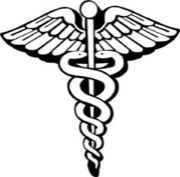'Alarm symptoms' are good predictors of cancer diagnosis in primary care
May 11, 2007
Alarm Symptoms、「ぎくっとするような警告的な症状」と訳しましたが、それが「癌の早期摘発と治療に有用であるかもしれない」というのがこの文章のいいたい事なんだと思います。
オリジナル文章の下に勝手に分解した文章があるのでよければお読み下さい。
----
ST LOUIS (MD Consult) - Especially in men and elderly patients, specific "alarm symptoms" may promote earlier diagnosis of cancer for primary care patients, suggests a study published online in the British Medical Journal.
The analysis included 762,325 patients, aged 15 years or older, drawn from the U.K. General Practice Database. The patients were registered with 128 general practices between 1994 and 2000. The data were reviewed to identify initial episodes of four alarm symptoms—hematuria, hemoptysis, dysphagia, and rectal bleeding—in patients with no previous diagnosis of cancer. These symptoms were evaluated as predictors of the diagnosis of urinary, respiratory, esophageal, and colorectal cancers over the subsequent 3 years. The lead author was Dr Roger Jones of King's College London.
A total of 11,108 initial episodes of hematuria were linked to 472 diagnoses of urinary tract cancers in men and 162 cases in women. The 3-year positive predictive value of this symptoms was 7.4% for men and 3.4% for women. There were 4,812 initial occurrences of hemoptysis, associated with 220 diagnoses of respiratory cancer in men and 81 in women: positive predictive values were 7.5% and 4.3%, respectively.
A total of 5,999 initial episodes of dysphagia led to diagnosis of 150 esophageal cancers in men, positive predictive value 5.7%, and 81 in women, positive predictive value 2.4% Analysis of rectal bleeding identified 15,289 episodes associated with 184 cases of colorectal cancer in men and 154 cases in women. Positive predictive values were 2.4% and 2.0%, respectively.
The power of the alarm symptoms to predict subsequent cancer diagnoses increased with patient age. Predictive ability was particularly high in certain groups: hemoptysis had a 17.1% positive predictive value for hemoptysis among men aged 75 to 84 years. For men aged 65 to 74, dysphagia carried a predictive value of 9.0%.
"Alarm symptoms" often play a role in triggering patient referrals from primary to secondary care. However, in many instances, the data supporting the significance of alarm symptoms is weak. Primary care practitioners may use highly individualized approaches to deciding which patients should be referred.
This database analysis finds that the alarm symptoms of hematuria, hemoptysis, dysphagia, and rectal bleeding are associated with significant rates of cancer diagnosis within the subsequent 3 years. The positive predictive values of these symptoms increase with age, and may be especially high among elderly men. Early investigation of alarm symptoms in primary care patients may be a useful approach to earlier identification and treatment of cancers, the investigators suggest.
----
最後のパラグラフだけを解釈していきたいと思います。
長い文章を読む場合、いつも私はThis is a pen という簡単な形に当て合わせて解釈しています。
>
(S) This database analysis
{V}finds that
<O/C> (S2)the alarm symptoms
{V2}are associated with [[significant rates of]] cancer diagnosis within the subsequent 3 years.
--------------------
(S)Early investigation of alarm symptoms [[in primary care patients]]
{V}may be a useful approach /to earlier identification and treatment of cancers.
長かったら短く切って、余計な単語は捨てて読んでみてSVOなど形を見出してから形容詞などを足していく...そんな風に2度に分けて読んだりすると初めは手間がかかるけれど、形が見出せたらそのうち早く読めるようなそんな気がしますが。皆さんは長い文章はどうやっておよみなのでしょうか。
May 11, 2007
Alarm Symptoms、「ぎくっとするような警告的な症状」と訳しましたが、それが「癌の早期摘発と治療に有用であるかもしれない」というのがこの文章のいいたい事なんだと思います。
オリジナル文章の下に勝手に分解した文章があるのでよければお読み下さい。
----
ST LOUIS (MD Consult) - Especially in men and elderly patients, specific "alarm symptoms" may promote earlier diagnosis of cancer for primary care patients, suggests a study published online in the British Medical Journal.
The analysis included 762,325 patients, aged 15 years or older, drawn from the U.K. General Practice Database. The patients were registered with 128 general practices between 1994 and 2000. The data were reviewed to identify initial episodes of four alarm symptoms—hematuria, hemoptysis, dysphagia, and rectal bleeding—in patients with no previous diagnosis of cancer. These symptoms were evaluated as predictors of the diagnosis of urinary, respiratory, esophageal, and colorectal cancers over the subsequent 3 years. The lead author was Dr Roger Jones of King's College London.
A total of 11,108 initial episodes of hematuria were linked to 472 diagnoses of urinary tract cancers in men and 162 cases in women. The 3-year positive predictive value of this symptoms was 7.4% for men and 3.4% for women. There were 4,812 initial occurrences of hemoptysis, associated with 220 diagnoses of respiratory cancer in men and 81 in women: positive predictive values were 7.5% and 4.3%, respectively.
A total of 5,999 initial episodes of dysphagia led to diagnosis of 150 esophageal cancers in men, positive predictive value 5.7%, and 81 in women, positive predictive value 2.4% Analysis of rectal bleeding identified 15,289 episodes associated with 184 cases of colorectal cancer in men and 154 cases in women. Positive predictive values were 2.4% and 2.0%, respectively.
The power of the alarm symptoms to predict subsequent cancer diagnoses increased with patient age. Predictive ability was particularly high in certain groups: hemoptysis had a 17.1% positive predictive value for hemoptysis among men aged 75 to 84 years. For men aged 65 to 74, dysphagia carried a predictive value of 9.0%.
"Alarm symptoms" often play a role in triggering patient referrals from primary to secondary care. However, in many instances, the data supporting the significance of alarm symptoms is weak. Primary care practitioners may use highly individualized approaches to deciding which patients should be referred.
This database analysis finds that the alarm symptoms of hematuria, hemoptysis, dysphagia, and rectal bleeding are associated with significant rates of cancer diagnosis within the subsequent 3 years. The positive predictive values of these symptoms increase with age, and may be especially high among elderly men. Early investigation of alarm symptoms in primary care patients may be a useful approach to earlier identification and treatment of cancers, the investigators suggest.
----
最後のパラグラフだけを解釈していきたいと思います。
長い文章を読む場合、いつも私はThis is a pen という簡単な形に当て合わせて解釈しています。
>
(S) This database analysis
{V}finds that
<O/C> (S2)the alarm symptoms
{V2}are associated with [[significant rates of]] cancer diagnosis within the subsequent 3 years.
--------------------
(S)Early investigation of alarm symptoms [[in primary care patients]]
{V}may be a useful approach /to earlier identification and treatment of cancers.
長かったら短く切って、余計な単語は捨てて読んでみてSVOなど形を見出してから形容詞などを足していく...そんな風に2度に分けて読んだりすると初めは手間がかかるけれど、形が見出せたらそのうち早く読めるようなそんな気がしますが。皆さんは長い文章はどうやっておよみなのでしょうか。
|
|
|
|
|
|
|
|
Medical English-Japanese 更新情報
-
最新のアンケート
-
まだ何もありません
-























